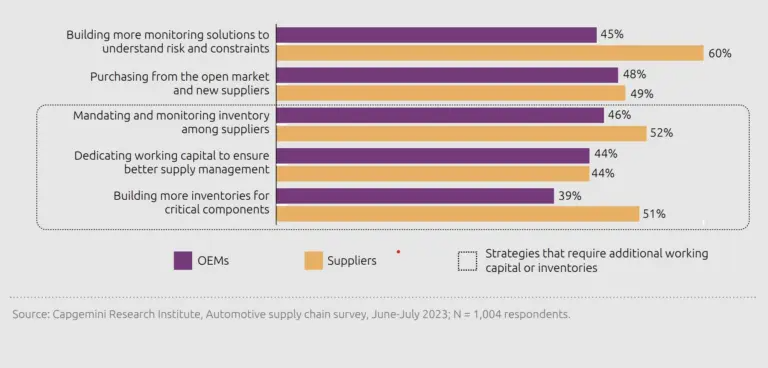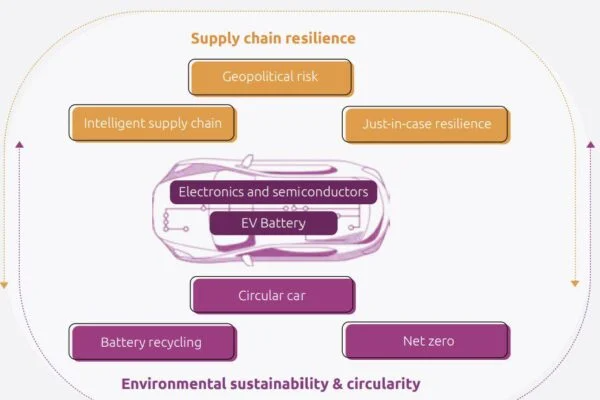A report from the Capgemini Research Institute is warning that the automotive supply chain for semiconductors is not sustainable in the long term.
The report, titled The automotive supply chain: Pursuing long-term resilience, highlights that automotive organizations now feel more confident to tackle future supply chain disruptions but have to rethink, restructure, and refinance their supply chain management.
While issues have been stabilized in the short-term, supply chains are still transforming due to their complexity and evolving factors, including the shift to electric vehicle (EV) production, the new regulatory and government policies, and the adoption of the software defined vehicle.
- How to break a supply chain
- Chip bottleneck threatens to curb car industry in the long term
- Cars are too complex says Stellantis CTO, cuts number of chips.
Only half of OEMs consider the current supply of semiconductor components as secure. Of those surveyed, 70% said the majority of supply is currently being obtained from China, Taiwan, Japan, and Korea.
In a bid to achieve a greater level of supply-security OEMs are investing in alternative supply methods and moving away from tier-1 and -2 suppliers. Similarly, OEMs have secured only three years of EV battery raw materials on average.

Successive supply chain crises have sapped automakers’ time and diverted focus and investment away from sustainability initiatives.
Consequently, sustainability is not currently considered a priority for many of them, with only 37% of respondents stating that issues such as carbon footprint management and environmental risk influence supply chain decision-making. Investment across the industry reflects this trend and while OEMs’ total investment in supply chain sustainability is on par with last year, suppliers’ annual investment has significantly reduced by 17%.
- Chip shortage hits UK car production
- Missing chips cost European auto industry €100bn
- Ukraine war hits European automotive industry
While sustainability and circularity are key components for building a more resilient supply chain and to future-proof operations, the scaling of circular-economy initiatives has been delayed due to a shortage of suppliers of recycled materials (and of the materials themselves).
A global re-orchestration is underway as procurement from offshore locations fell by 22% in the past two years. Europe leads this trend having reduced offshore procurement by a quarter since 2021. This is followed by APAC and the US who have reduced offshore sourcing by 20% and 18% respectively.
The report finds that automotive organizations expect procurement from offshoring locations to reduce by a further 19% by 2025, as electric vehicle production surges and the fabrication of key electronics components relocates.
Automotive organizations need to balance sustainability and circular economy with factors like cost and affordability. According to the report, digital solutions can help address this delicate balance between these various competing factors.
The creation of new supply chains for semiconductors and electric vehicles will accelerate nearshoring. The average proportion of vehicle value attributed to semiconductors and sensors increased by 51% over the last two years and this is expected to increase by a further 46% between 2023 and 2025.
According to the report, only half of OEMs feel confident that they would be able to avoid 60% of the revenue loss they incurred in 2022 if the same scenarios, including the semiconductor shortage, happened again today.
To address operational and logistic issues, both suppliers and OEMs have adopted strategies based on adding operational investment and working capital. This is led by the building of inventories, which 81% of suppliers and 44% of OEMs have implemented. However, it’s clear that this is unsustainable in the long-term as holding excessive inventory risks a variety of negative effects on the operational and financial wellbeing of automotive organizations.
Data-driven intelligent automotive supply chain
A lack of a data-driven intelligent supply chains impedes the automotive industry’s goal for long-term resilience. Only half (53%) of respondents have a mature intelligent supply chain in place to enable data-driven decision making, allowing for the integration of newer technologies such as AI and data analytics.
With growing participation in standardized, open, and trusted data ecosystems that include new suppliers for software driven services, automotive organizations can further progress resilience and sustainability ambitions.
The Capgemini Research Institute surveyed 1,004 senior executives from leading global automotive organizations from across 10 different countries, during June and July in 2023. These organizations are comprised of 449 automotive OEMs with more than $1 billion in annual revenue and automotive suppliers from across 10 countries with annual revenue above $500 million.
- €10bn EMSC joint venture FINFET fab for Europe
- 3nm AI chips and 6nm microcontrollers will be key to ESMC
“Over the past few years, organizations have been forced to restructure and refinance supply chain management on the fly in order to navigate multiple disruptions from all fronts. While in a more positive place today, automakers need to look at delivering a long-term, intelligent, and data-driven strategy that will build resilience and competitive advantage,” said Alexandre Audoin, Global Head of Automotive Industry at Capgemini.
“More so, this needs to incorporate circularity as an essential component, not only to help organizations navigate regulatory changes, but to embed new players in the supply chain ecosystem and also achieve ambitious climate-targets.”
The report is here



Leave a comment